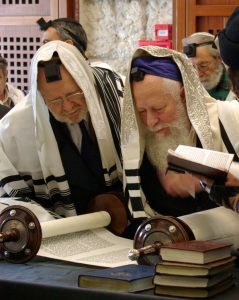 Last week the yearly Torah study began again. The scrolls have been rewound from Deuteronomy back to Genesis, and once again, Jews will ruminate over Adam and Eden and Abel. Week by week over thousands of years, they’ve engaged in the study of the Pentateuch together.
Last week the yearly Torah study began again. The scrolls have been rewound from Deuteronomy back to Genesis, and once again, Jews will ruminate over Adam and Eden and Abel. Week by week over thousands of years, they’ve engaged in the study of the Pentateuch together.
Often I’m asked what my favorite resources are for Bible study. What can help us understand how they sounded to their original, ancient hearers?
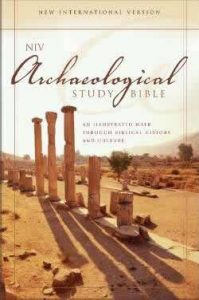 There are plenty of good resources from Christian scholars. The Archaeological Study Bible (NIV) for one. It overflows with sidebars and articles about the ancient context, with images and charts and maps. It’s an excellent resource if you’re getting started.
There are plenty of good resources from Christian scholars. The Archaeological Study Bible (NIV) for one. It overflows with sidebars and articles about the ancient context, with images and charts and maps. It’s an excellent resource if you’re getting started.
But what if you want to read them from a Jewish point of view? Once again there’s a lot out there. But my interest isn’t so much in how contemporary rabbis read the text, but how the ancient Jews read the text. I want to consider its timeless message in light of its historic context.
~~~
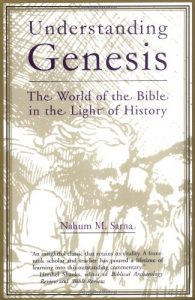 With this in mind, two of my favorite books are by Nahum Sarna, a renowned Jewish scholar and historian.
With this in mind, two of my favorite books are by Nahum Sarna, a renowned Jewish scholar and historian.
If you are reading Genesis now, check out his classic work, Understanding Genesis: The World of the Bible in Light of History (Schocken, 1970). I loved how he describes how awe-inspiring and incomparable the biblical text was to anything else in the ancient Near East.
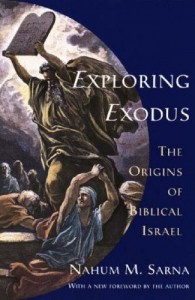 Nahum Sarna’s book, Exploring Exodus: The Origins of Biblical Israel, (Schocken, 1996) is also a classic that has been read widely.
Nahum Sarna’s book, Exploring Exodus: The Origins of Biblical Israel, (Schocken, 1996) is also a classic that has been read widely.
His section on the humanitarian differences between the laws of Israel and those of surrounding nations is especially good.
~~~
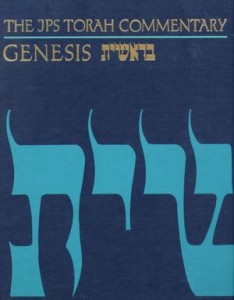 If you want to go into more depth, I highly recommend the JPS Torah Commentary series by the Jewish Publication Society (JPS). These five volumes go through the text of the Torah line by line, shedding light on nuances of Hebrew wording and imagery, as well as history.
If you want to go into more depth, I highly recommend the JPS Torah Commentary series by the Jewish Publication Society (JPS). These five volumes go through the text of the Torah line by line, shedding light on nuances of Hebrew wording and imagery, as well as history.
In the back of each JPS Commentary are essays that go into even more depth. What did the “binding of Isaac” story mean to its ancient listeners? What was the idea behind the symbolism of the red heifer? Why did God command the Israelites to wear tassels? This is the first source I go to when I’m studying.
~~~
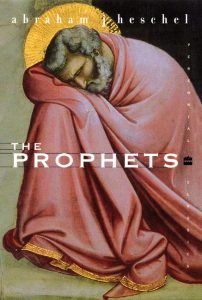 The other Jewish book that is at the very top of my list is The Prophets, by Abraham Heschel. If you are studying Isaiah, Jeremiah, or other prophetic books, this is a must-read. It is also classic on the problem of evil from a biblical perspective. The original, published in 1962, was hailed by both Christian and Jewish theologians as a landmark work.
The other Jewish book that is at the very top of my list is The Prophets, by Abraham Heschel. If you are studying Isaiah, Jeremiah, or other prophetic books, this is a must-read. It is also classic on the problem of evil from a biblical perspective. The original, published in 1962, was hailed by both Christian and Jewish theologians as a landmark work.
The paperback version of The Prophets has two sections, and the first seven chapters of the second section are, in my opinion, the highlight of the book. There Heschel describes how the prophets communicated the passionate love of God for humanity, and how God’s love exists in tension with his anger with human evil. Truly, an outstanding book.
~~~
What amazes me about all of the books I’ve mentioned above is how their Jewish authors navigate a wise path between two pitfalls which often plague Christian scholars — the arid skepticism of liberals and the brittle defensiveness of conservatives. I think this is because they read the Bible with a “both-hands” mentality. As Heschel explains,
The demands of piety are a mystery before which man is reduced to reverence and silence. Reverence, love, prayer, and faith go beyond the acts of shallow reasoning. [But] without reason faith becomes blind. … The worship of reason is arrogance and betrays a lack of intelligence. The rejection of reason is cowardice and betrays a lack of faith.
It’s fascinating, really, to hear how these scholars grapple honestly with historical data while being confident that the Bible is inspired by a loving God.
Lon A. Wiksell says
I have read most of the books you have suggested and you are correct. I have found that the Jewish scholars provide us a view that bypasses the typical Christian viewpoint. I might suggest some others: Daniel Boyarin’s Border Lines and The Jewish Gospels and Amy-Jill Levine’s The Misunderstood Jew and The Annotated New Testament. Other great authors include Geza Vermes, Alfred Edersheim, David Instone-Brewer, David Stern and Dan Juster. Thanks for the great website.
Constance Gilbert says
Jeff A. Benner is another author that has helped me to understand Hebrew words. Breaking a word down letter by letter has given me new eyes and thus a better understanding of Scripture.
Tova says
This excites me. I can also offer this book list to my liberal friends and perhaps we can someday meet on common ground. I hate the brittle defensiveness in me and how it shuts down any meaningful conversation. Your comment about “wise path” reminded me of the chapter “Yes and Yes” in another book you recommended, The Gospel According to Moses. There I learned the Bible contains paradoxes not contradictions. I don’t have to feel pressured to defend so called contradictions that I never understood either. For now I should just shut up and study. If you want fresh, new ideas go back to the ancients.
Janet Hughes says
Would Tova give me the author of The Gospel according to Moses? I went into Alibris.com and there were several books with that title by different authors. Thank you.
Lois Tverberg says
Janet, the author of The Gospel According to Moses is Athol Dickson. I included that title in my recent list of recommended books, “Good First Reads about Jesus’ Jewish Context.”
James N. Benko says
For me, it gives me great pleasure and satisfaction to read my Christian daily devotionals using the “Complete Jewish Bible” by David H. Stern. It’s a remarkable book written by a Messianic Jewish scholar. I replace my standard Christian vocabulary with a Hebrew/Jewish one even when reading my devotionals. This Bible can do an excellent job helping you to do that. At first, a person can be clueless on how to pronounce certain words in Hebrew if not given a pronunciation guide. This is where the CJB comes short. The only best Hebrew pronunciation guide that I have come across so far is “The Delitzsch Hebrew Gospels” by Franz Delitzsch and is published by Vine of David, an affiliate of First Fruits of Zion located in Marshfield, Missouri. There’s so much good resources out there to understand the Jewish roots of our faith. We ignore it to our own spiritual peril. Let’s make the best use of them.
Lorraine Miller says
Are there any good books written by Jewish followers of Jesus on the four Gospels? I would really like to read something on the Gospels from a Jewish person who is a Believer with a good knowledge of Hebrew and N.T. times and customs. I have Edersheim’s “Life and Times of Jesus the Messiah”. Is there anything like the books you’re suggesting here on Genesis and Exodus for the Gospels?
Thanks for any direction you can give me.
Tom Schuessler says
Lois: I am one of your biggest fans. Right now our family is working on the kosher mouth. On your advice I am reading Rabbi Heschel. Never expected to get this from him, but he has some tremendous insights into the basic question: Why Study the OT? I blogged about that today. http://gospelthemes.blogspot.com/2012/11/why-study-bible-heschel-part-2.html
Keep up your great work. Tom S. Mayville WI
Lois Tverberg says
Tom, thanks for sharing. Very nice article and blog.
Anne Warden says
This is for Lorraine Miller:
If you have David H. Stern’s ‘Complete Jewish Bible’, I recommend buying his ‘Jewish New Testament Commentary’ also. In his Commentary, you will find many footnotes that are an excellent help. The entire Commentary is 857 pages long and the portion on the Gospels takes up the first 214 of those pages.
Lorraine Miller says
Dear Lois and Anne,
Thank you so much for your suggestions. Lois, I bought The Gospel According to Moses and Jesus the Jewish Theologian. Both have already proven helpful. Anne, I have gotten both the books you suggested and will be using them as I prepare to teach—we’re currently studying the first two chapters of Luke and Matthew. I appreciate your help with this.
Blessings.